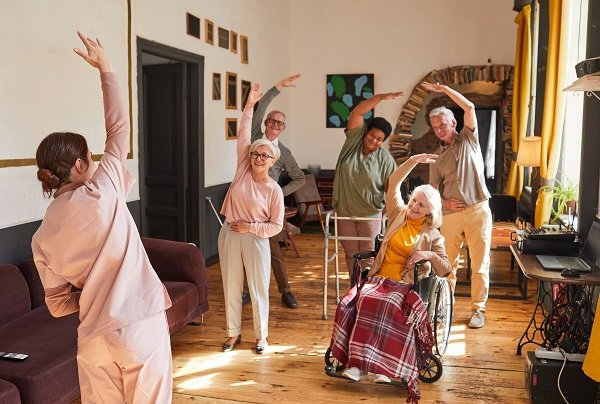Benefits of Memory Care for Seniors

What Is Memory Care?
Memory care provides specialized support for those living with memory loss. It is designed to help them maintain their independence and dignity while living in a supportive environment. Memory care can be provided at home, in an assisted living facility.
Memory care aims to provide people with the best quality of life possible by providing them with the right level of support, so they can continue to live as they would like. This includes providing:
– Activities that promote mental health and well-being
– Caregiver support
– Coordination of medical and nonmedical services
– Personalized service plans
– Proper nutrition
– Safety measures
Memory care is a form of senior care that focuses on the unique needs of people with Alzheimer’s and other forms of dementia. Memory care centers have specially trained staff who provide a safe, comfortable, and supportive environment for seniors with memory loss. Memory care centers are designed to maintain the dignity and independence of residents, while also providing them with assistance if needed. The typical day in a memory care center includes activities that stimulate cognitive function, such as games, puzzles, crafts, music therapy, cooking classes, and more.
The Alzheimer’s Association defines dementia as “a disease of the brain that affects memory, thinking, and behavior. Symptoms include new problems with memory and language. They may also experience changes in personality and physical abilities.
Here are some benefits of memory care listed below:
Physical Safety
Memory care is a big decision for seniors and their families. These facilities provide a well-rounded experience that is tailored to the needs of the particular person. They can help to improve quality of life and can also reduce medical costs.
There are many benefits associated with memory care and physical safety. Memory care homes typically have floor plans that are easy to navigate and have few places for a person with dementia to get lost. They also have a higher staff-to-resident ratio that makes it easier for caregivers to monitor the person for wandering or other at-risk behaviors.
Memory care communities provide a safe and supportive environment where residents can thrive. They are staffed with specially trained staff to accommodate the needs of individuals with dementia and other cognitive disorders.
Elimination of Behavioral Problems
Memory care eliminates many behavioral problems, such as yelling and wandering. Furthermore, it provides a safe and comfortable environment for patients who need supervision and support that’s tailored to the patient’s needs.
They work collaboratively with the families to eliminate these behaviors, such as refusing to eat, sleeping all day, anxiety, or aggression, and they help the seniors or memory care patients feel better while they are living at home.
A Safe Environment
Memory care facilities have been designed with the specific needs of seniors in mind. There are a number of benefits that you can expect to find by choosing this type of living situation. Residents will be able to spend their time exploring their new environment and making friendships with other people who are going through the same experiences.
Memory care is a form of assisted living that caters to people with Alzheimer’s and dementia. Alzheimers Care in Celina Tx provides a safe and supportive environment where residents can live independently. They are among the best environments for those who are faced with memory loss and who need assistance with day-to-day activities.
Protecting the Quality of Life of the Patient
Memory care protects the quality of life of the patient. Patients are often at a loss of where to go, and what to do and can feel lost when they or their family members are not able to provide appropriate care. In these cases, it is best to leave the decision up to a professional caregiver that understands the specific needs of this population. Memory care facilities provide an environment where the patient can feel safe, comfortable, and happy.
What are the Top Ten Signs of Alzheimer’s Disease?

The top ten signs of Alzheimer’s Disease are as follows:
1. Memory loss.
2. Difficulty remembering recent events.
3. Difficulty completing familiar tasks.
4. Problems with language, speaking or understanding words, reading, writing, and comprehending visual information.
5. Poor judgment, misplacing things, and losing the ability to plan or organize tasks.
6. Challenges in solving problems and following instructions.
7. Confusion about time or place.
8. Changes in mood and personality such as depression, apathy or irritability; anxiety; loss of interest in activities that were once enjoyed; difficulty sleeping through the night; increased confusion at night time; agitation.
9. Changes in health such as difficulty swallowing, appetite changes, being constipated or losing weight.
10. Changes in physical complaints such as headaches, heart problems, and dizziness.
Ways to Enhance Memory for Seniors

Memory is an important and vital part of our lives. It has been said that we use it to remember the past, plan for the future, and understand the present. Memory is also a very important aspect of our cognitive function, which is affected by aging.
The following tips will help seniors enhance their memory.
1) Exercise: Regular exercise can help improve your memory. It also has other benefits such as a healthier heart, better sleep, and reduced stress levels. Exercise has been shown to increase blood flow to the brain and improve memory function as well as moods and energy levels.
2) Medication: If you have been diagnosed with dementia or Alzheimer’s disease, you may be prescribed medication that can slow down the progression of the condition and also help with everyday tasks like remembering where you put your keys or what you had for lunch.
3) Diet: Eating a nutritious diet is an important step in maintaining a healthy brain shape and size.
4) Socializing: Being social is an excellent way to stay mentally sharp and keep your mind focused.
5) Brain Training: There are many computer programs available that provide brain training exercises such as Brain Fitness Pro or Lumosity which have been shown to decrease age-related memory decline.
6) Music: Music-aided memory for those with Alzheimer’s has even been shown to increase the capability of learning and remembering new languages.
How to Choose the Best Memory Care Facility for Your Loved One
A memory care facility is a type of residential care home for the elderly or disabled. It’s a setting that focuses on the needs of people with memory loss and dementia. Memory care facilities provide specialized care for residents with Alzheimer’s, Parkinson’s, or other types of dementia. They are designed to help residents maintain their independence as long as possible while minimizing confusion and anxiety due to their illness.
There are many things you should consider when choosing a memory care facility. You need to consider what kind of environment you want your loved one to live in and how much money you want to spend on them per month. The more expensive the facility, the more they will offer in terms of amenities and activities for your loved one.
Choosing the best memory care facility for your loved one can be a difficult decision. There are many factors that you need to consider before making a decision.
- What is the level of care needed by my loved one?
- How much does the facility cost?
- Is the facility near my home?
- What is the size of the staff-to-resident ratio?
- What type of staff is on duty during the day and at night?
- What is the availability of activities and services?
- What is the availability of food options?
- What are the available activities for my loved ones?
- Does the facility provide services to help my loved ones with their personal hygiene needs?
- Does the facility have a policy on dietary restrictions, including kosher, vegan, and vegan-friendly options, gluten-free, etc?
- How many people live in the facility?
- Does my loved one have access to a telephone and facsimile machine?
- Will my loved one be able to transfer from this facility if needed?
If you are located in Celina or nearby then check out the Alzheimers care near you for your loved ones. This will help to get a more comfortable and convenient lifestyle for seniors.








